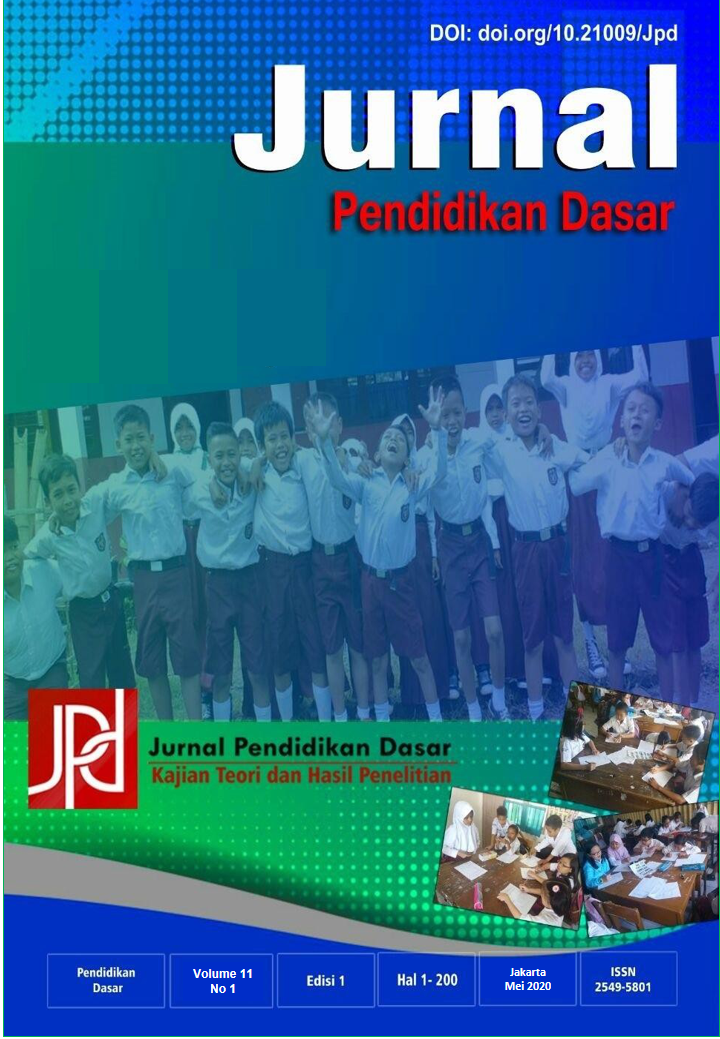IMPLEMENTASI KARAKTER CINTA TANAH AIR PADA KESENIAN TRADISIONAL JAWA INDONESIA
DOI:
https://doi.org/10.21009/jpd.v11i1.15392Keywords:
Nationalism Characters, Karawitan, ExtracurricularAbstract
This study aims to describe and interpret the implementation of the character of patriotism in traditional Javanese Indonesian art. This research method uses a qualitative descriptive approach with interviews, observations, field notes, and documentation as data collection techniques. The research unit is the principal, musical teacher, and students. Data validity test is done using triangulation of sources and techniques. Data were analyzed using the interactive model of Miles and Huberman. The results showed that (1) Javanese tradi-tional culture at SD N Grogol reflected the nationalism character which was implemented in musical extracurricular activities. (2)Careful planning and implementation of musical activities rou-tinely carried out every week forms the character of the nationalism in students, namely the atti-tude of respect and preserve the nation's culture. (3) Karawitan culture can provide role models that contain the value of the nationalism character and can be applied by students in life. This study concluded that the Javanese traditional culture at SDN Grogol reflected the nationalism character that is implemented in musical extracurricular activities.
References
Ahlerup, P., & Hansson, G. (2011). Nationalism and government effectiveness. Journal of Comparative Economics, 39(3), 431–451. https://doi.org/10.1016/j.jce.2011.05.001
Ahmed, W., van der Werf, G., Kuyper, H., & Minnaert, A. (2013). Emotions, self-regulated learning, and achievement in mathematics: A growth curve analysis. Journal of Educational Psychology, 105(1), 150–161. https://doi.org/10.1037/a0030160
Aprilina, N., Fauziah, T., & Affan, M. H. (2017). Implementasi Pendidikan Karakter Cinta Tanah Air Melalui Pembelajaran IPS di Gugus 25 SDN 2 Mata IE Aceh Besar. Jurnal Ilmiah Pendidikan Guru Sekolah Dasar, 2 (3), 32–40.
Atika, N. T., Wakhuyudin, H., & Fajriyah, K. (2019). Pelaksanaan Penguatan Pendidikan Karakter. Jurnal Mimbar Ilmu, 24(1), 105–113.
Bakar, A. (2015). Konsep Toleransi Dan Kebebasan Beragama. Toleransi, 7(2), 123–131. https://doi.org/10.24014/trs.v7i2.1426
Chaharbashloo, H., Gholami, K., Aliasgari, M., Talebzadeh, H., & Mousapour, N. (2019). Analytical reflection on teachers’ practical knowledge: A case study of exemplary teachers in an educational reform context. Teaching and Teacher Education, 87, 102931. https://doi.org/10.1016/j.tate.2019.102931
Fahmy, R., Bachtiar, N., Rahim, R., & Malik, M. (2015). Measuring Student Perceptions to Personal Characters Building in Education: An Indonesian Case in Implementing New Curriculum in High School. Procedia - Social and Behavioral Sciences, 211, 851–858. https://doi.org/10.1016/j.sbspro.2015.11.112
Fibrianto, A. S., & Bakhri, S. (2018). Pelaksanaan Aktivitas Ekstrakurikuler Paskibra (Pasukan Pengibar Bendera) Dalam Pembentukkan Karakter, Moral Dan Sikap Nasionalisme Siswa Sma Negeri 3 Surakarta. Jurnal Moral Kemasyarakatan, 2(2), 75. https://doi.org/10.21067/jmk.v2i2.1970
Jondya, A. G., & Iswanto, B. H. (2017). Indonesian’s Traditional Music Clustering Based on Audio Features. Procedia Computer Science, 116, 174–181. https://doi.org/10.1016/j.procs.2017.10.019
Kadek Mustika, I. (2018). Local Wisdom-Based Character Education In Teaching Balinese To Achieve National Integration Of a Nation. SHS Web of Conferences, 42(September 2011), 00013. https://doi.org/10.1051/shsconf/20184200013
Lickona, T. (1991). Education for Character : How Our School Can Teach Respect and Responsibility. New York, Toronto, London, Sydney: Aucland : Bantam nooks.
Miles, M. B. (2014). Qualitative Data Analysis.
Muslich, M. (2011). Pendidikan Karakter. Jakarta: PT Bumi Aksara.
Muslimin., M. (2017). A Traditional Communication of Bugis (Note 1) in the South Sulawesi of Indonesia through the Art Performance of Kecapi. Asian Social Science, 13(3), 21. https://doi.org/10.5539/ass.v13n3p21
Nurhayati, Y. (2013). Pengaruh Upacara Bendera Terhadap Sikap Nasionalisme. Bandung: Universitas Pendidikan Indonesia.
Obergriesser, S., & Stoeger, H. (2020). Students’ emotions of enjoyment and boredom and their use of cognitive learning strategies – How do they affect one another? Learning and Instruction, 66(December 2018), 101285. https://doi.org/10.1016/j.learninstruc.2019.101285
Rohmah, S. (2019). Konsep Membentuk Karakter Anak Berbasis Al- Qur ’ An. Jurnal Qiro’ah, 9(1).
Santiprasitkul, S., Sithivong, K., & Polnueangma, O. (2013). The First Year Nursing Students’ Achievement And Critical Thinking In Local Wisdom Course Using Problem Based Learning Process. Wireless Personal Communications, 69(3), 1077–1085. https://doi.org/10.1007/s11277-013-1067-2
Supinah & Parmin. (2011). Modul Matematika SD Program Bermutu Pengembangan Pendidikan Budaya dan Karakter Bangsa Melalui Pembelajaran Matematika di SD. Yogyakarta: Kementrian Pendidikan Nasional.
Surtikanti, H. K., Syulasmi, A., & Ramdhani, N. (2017). Traditional Knowledge of Local Wisdom of Ammatoa Kajang Tribe (South Sulawesi) about Environmental Conservation. Journal of Physics: Conference Series, 895(1). https://doi.org/10.1088/1742-6596/895/1/012122
Suyadi. (2013). Strategi Pembelajaran Pendidikan Karakter. Bandung: PT. Remaja Rosdakarya.
Utami, R. D., Sari, I. N., & Melindayani, S. (2018). Generasi Berkarakter Dengan Mocita (Monopoli Cinta Tanah Air) Dalam Meningkatkan Mutu Pendidikan Karakter Pada Diri Anak Sekolah Dasar. Pena : Jurnal Penelitian Dan Penalaran, 4(2), 825–833. Diambil dari https://journal.unismuh.ac.id/index.php/pena/article/view/1626
Downloads
Published
How to Cite
Issue
Section
License
Jurnal Pendidikan Dasar





















